
 i_need_contribute
i_need_contribute
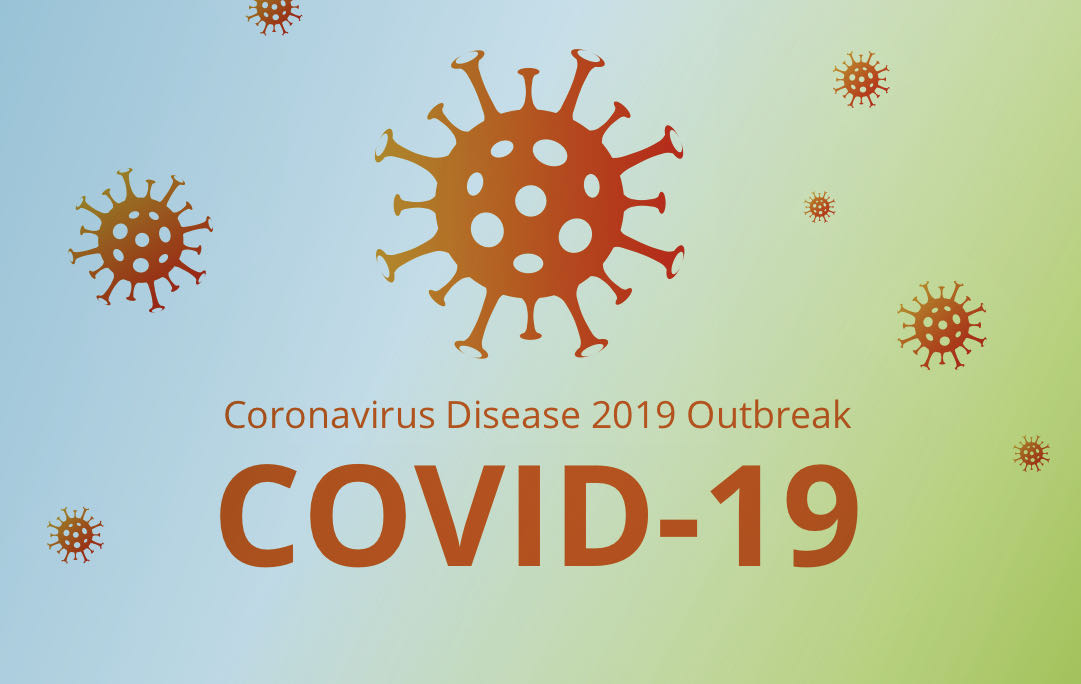
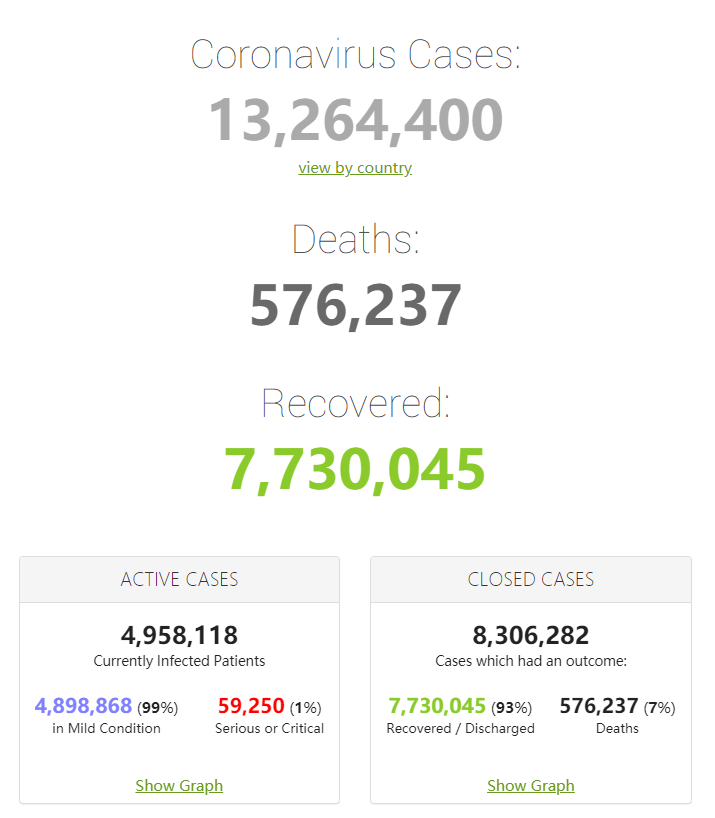
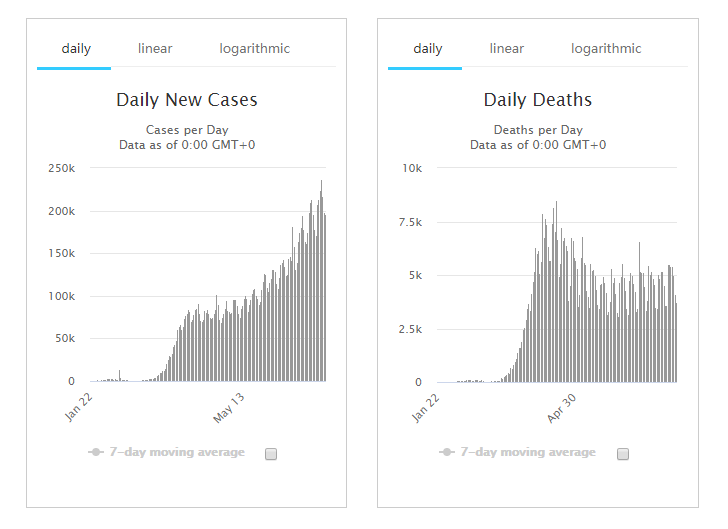
|
# |
Country, |
Total |
New |
Total |
|
|
World |
13,229,600 |
+195,783 |
574,979 |
|
1 |
3,479,483 |
+65,488 |
138,247 |
|
|
2 |
1,887,959 |
+21,783 |
72,921 |
|
|
3 |
907,645 |
+28,179 |
23,727 |
|
|
4 |
733,699 |
+6,537 |
11,439 |
|
|
5 |
330,123 |
+3,797 |
12,054 |
|
|
6 |
317,657 |
+2,616 |
7,024 |
|
|
7 |
303,033 |
+681 |
28,406 |
|
|
8 |
299,750 |
+4,482 |
35,006 |
|
|
9 |
290,133 |
+530 |
44,830 |
|
|
10 |
287,796 |
+11,554 |
4,172 |
|
|
11 |
259,652 |
+2,349 |
13,032 |
|
|
12 |
251,625 |
+2,753 |
5,266 |
|
|
13 |
243,230 |
+169 |
34,967 |
|
|
14 |
235,111 |
+2,852 |
2,243 |
|
|
15 |
214,001 |
+1,008 |
5,382 |
|
|
16 |
200,436 |
+486 |
9,139 |
|
|
17 |
186,894 |
+3,099 |
2,391 |
|
|
18 |
172,377 |
+288 |
30,029 |
|
|
19 |
154,277 |
+3,832 |
5,455 |
|
|
20 |
108,155 |
+565 |
8,790 |
|
|
21 |
104,016 |
+418 |
149 |
|
|
22 |
103,265 |
+3,099 |
1,903 |
|
|
23 |
83,602 |
+8 |
4,634 |
|
|
24 |
83,001 |
+931 |
3,935 |
|
|
25 |
79,735 |
+2,229 |
3,250 |
|
|
26 |
76,981 |
+1,282 |
3,656 |
|
|
27 |
75,826 |
+31 |
5,536 |
|
|
28 |
68,459 |
+589 |
5,063 |
|
|
29 |
65,114 |
+182 |
468 |
|
|
30 |
62,707 |
+101 |
9,782 |
|
|
31 |
59,899 |
+1,646 |
375 |
|
|
32 |
58,179 |
+2,164 |
259 |
|
|
33 |
56,911 |
+652 |
1,597 |
|
|
34 |
55,508 |
+614 |
393 |
|
|
35 |
55,198 |
+344 |
334 |
|
|
36 |
54,133 |
+612 |
1,398 |
|
|
37 |
51,093 |
+71 |
6,137 |
|
|
38 |
48,187 |
+987 |
1,807 |
|
|
39 |
47,173 |
+1,540 |
932 |
|
|
40 |
46,818 |
+306 |
1,662 |
|
|
41 |
46,283 |
+322 |
26 |
|
|
42 |
45,506 |
+974 |
903 |
|
|
43 |
40,632 |
+1,962 |
365 |
|
|
44 |
38,190 |
+299 |
1,576 |
|
|
45 |
34,455 |
+4 |
1,012 |
|
|
46 |
33,476 |
+535 |
109 |
|
|
47 |
33,153 |
+595 |
744 |
|
|
48 |
32,948 |
+413 |
1,901 |
|
|
49 |
32,946 |
+63 |
1,968 |
|
|
50 |
32,151 |
+182 |
573 |
|
|
51 |
29,742 |
+387 |
1,244 |
|
|
52 |
28,090 |
+507 |
774 |
|
|
53 |
25,638 |
+10 |
1,746 |
|
|
54 |
24,988 |
+470 |
139 |
|
|
55 |
24,570 |
+529 |
313 |
|
|
56 |
21,868 |
+366 |
982 |
|
|
57 |
19,689 |
+494 |
1,018 |
|
|
58 |
19,439 |
+57 |
649 |
|
|
59 |
18,948 |
+51 |
708 |
|
|
60 |
18,639 |
+279 |
405 |
Source:https://www.worldometers.info/coronavirus/
As public schools in the United States plunged into crisis at the outset of the coronavirus outbreak, Education Secretary Betsy DeVos stuck to the message of decades of conservative education advocacy.
She championed her trademark policies of local and parental control, freeing states of federal mandates, loosening rules and funding opportunities that she said would help schools “rethink education” outside their brick-and-mortar buildings.
But now, as President Trump pushes public schools to reopen this fall, Ms. DeVos is demanding they do as Washington says, a stance diametrically opposite to how she has led the department.
Already a partisan lightning rod, she has become the face of the Trump administration’s efforts to open schoolhouse doors through force and threats.
“We have so politicized the situation we don’t know who we can trust, and it’s become very clear that we can’t trust her,” said Keri Rodrigues, the president of the National Parents Union, a collection of 200 advocacy organizations across 50 states representing parents from communities of color.
Even Ms. DeVos’s ideological allies are mystified.
“Betsy DeVos six months ago would have thought this was ludicrous,” said Michael J. Petrilli, the president of the Thomas B. Fordham Institute, a conservative research organization.
In a statement, the department defended Ms. DeVos’s push, saying that “if anyone is politicizing this issue it’s the unions, who are Democrats’ operatives, who are fear-mongering and denying the science that says it’s safe and better for kids’ overall health to be back in school.”
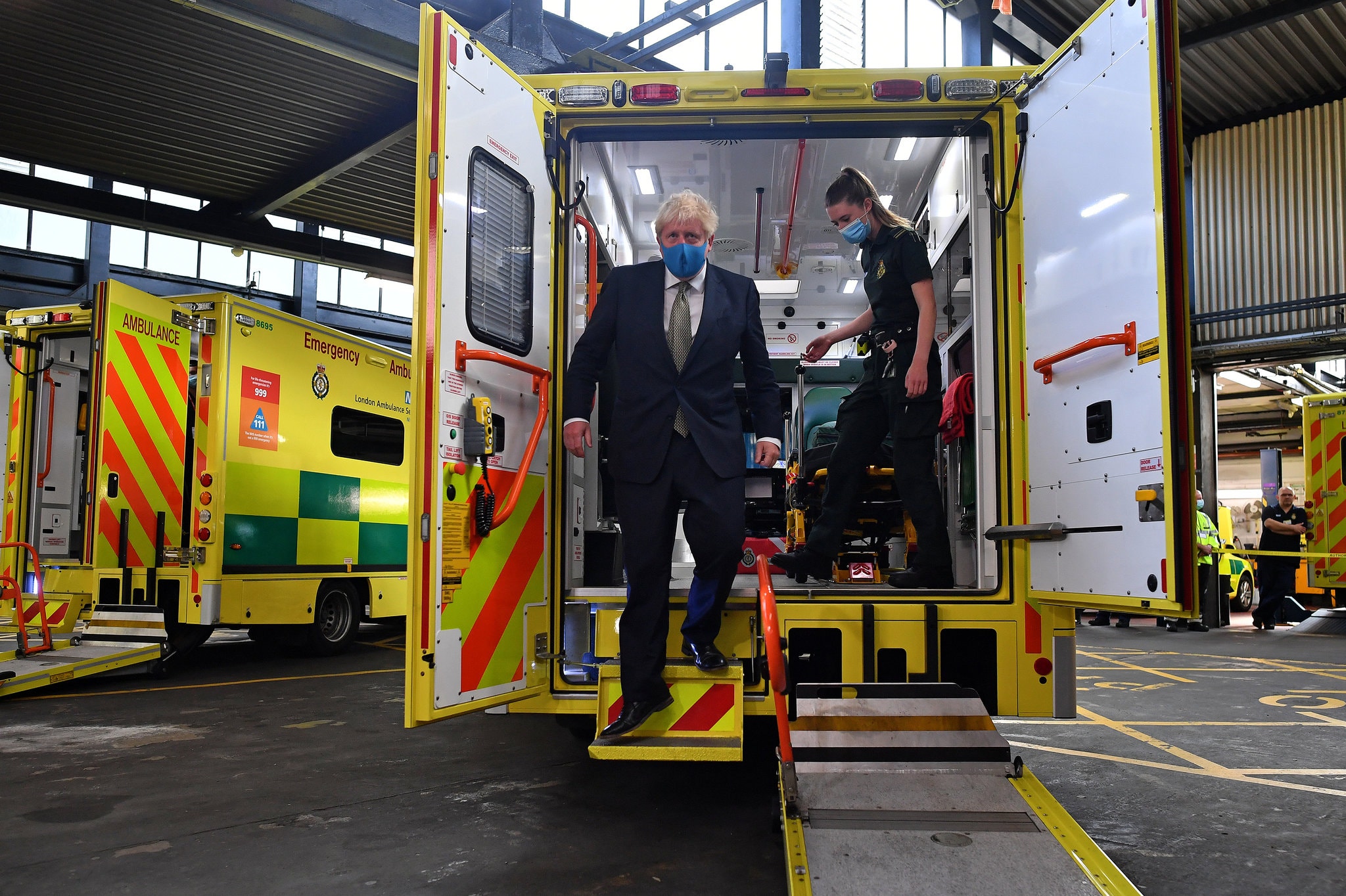
Prime Minister Boris Johnson wore a mask during a visit with health care workers in London on Monday.Credit...Pool photo by Ben Stansall
After months of equivocation over mandating face coverings to stop the spread of the coronavirus, the government of Prime Minister Boris Johnson of Britain was expected to announce on Tuesday that people would be required to wear masks inside shops and supermarkets.
The reversal, set to take effect next week, pulls England into line with other European countries, like Germany and Italy, and other parts of the United Kingdom, like Scotland, which has power over its own health measures.
Many scientists have found the months of dithering over face coverings in England mystifying. Unlike in the United States, where feelings about masks often fall along political lines, England’s hesitation stemmed in part from a scientific debate among advisers about the masks’ usefulness.
As recently as late April, the government’s powerful Scientific Advisory Group for Emergencies retroactively edited the minutes of a previous meeting to emphasize that “it would be unreasonable to claim a large benefit from wearing a mask.”
The advisers’ misgivings, resulting from a lack of randomized control trials, were symptomatic of what critics have called a rigid approach to the science that has slowed England’s response to the virus since March.
“Some scientists feel that a very high level of certainty is required before advice is given for the public to undertake wearing a mask or other behaviors that would reduce disease transmission,” said Paul Edelstein, an emeritus professor at the University of Pennsylvania, who helped write an influential report to the British government encouraging face coverings this month.
Masks have been mandatory on public transportation in England since mid-June. The government had previously encouraged masks in enclosed spaces, but Mr. Johnson resisted wearing one himself until Friday. As recently as this weekend, the government continued to give contradictory advice, with a prominent minister, Michael Gove, resisting the idea of mandating masks and saying that they were instead a matter of “courtesy and good manners.”
The government has indicated that the police, rather than shop owners, will enforce the new rules, with anyone who refuses facing a fine up to 100 pounds, or $125.

Medical workers treating a coronavirus patient at a hospital in Paris in April.Credit...Joel Saget/Agence France-Presse — Getty Images
France prepared to hail public health workers as heroes during Bastille Day celebrations on Tuesday for their role during the pandemic, a day after granting them 8 billion euros ($9.06 billion) in pay raises.
The traditional Bastille Day parade down the Champs-Élysées in Paris was canceled because of the pandemic, but President Emmanuel Macron and other officials were set to attend a smaller military ceremony on Tuesday morning that will include a tribute to health care professionals. Over 800 health workers from around France were also invited to a thank-you reception on Monday night in Paris.
Doctors, nurses, retirement home employees and others were widely praised for their role in the coronavirus crisis, and the French government had promised to address longstanding requests for increased hospital funding, better pay and more staffing.
After seven weeks of intense negotiations with the government, most health care unions and the government struck a deal that gives nurses, aides and other hospital or nursing home workers over $200 in monthly raises, as well as new bonuses for overtime and night work.
The deal also provides 450 million euros for doctors, mostly to increase an existing bonus for those who choose to work only in the public sector. Over all, the deal affects about 1.8 million health workers.
Jean Castex, Mr. Macron’s new prime minister, called the raises a “massive” investment in France’s public health system.
Not all unions signed the deal, and critics said it did not go far enough with more structural reforms.
Reporting was contributed by Aurelien Breeden, Reid J. Epstein, Nicholas Fandos, Manny Fernandez, Luis Ferré-Sadurní, Kimiko de Freytas-Tamura, Dana Goldstein, Erica L. Green, Shawn Hubler, Miriam Jordan, Zolan Kanno-Youngs, Dan Levin, Patricia Mazzei, David Montgomery, Benjamin Mueller, Azi Paybarah, Alan Rappeport, Nate Schweber, Michael D. Shear, Sheryl Gay Stolberg, Jim Tankersley, Declan Walsh and Noah Weiland.
From CNN's Michelle Toh in Hong Kong
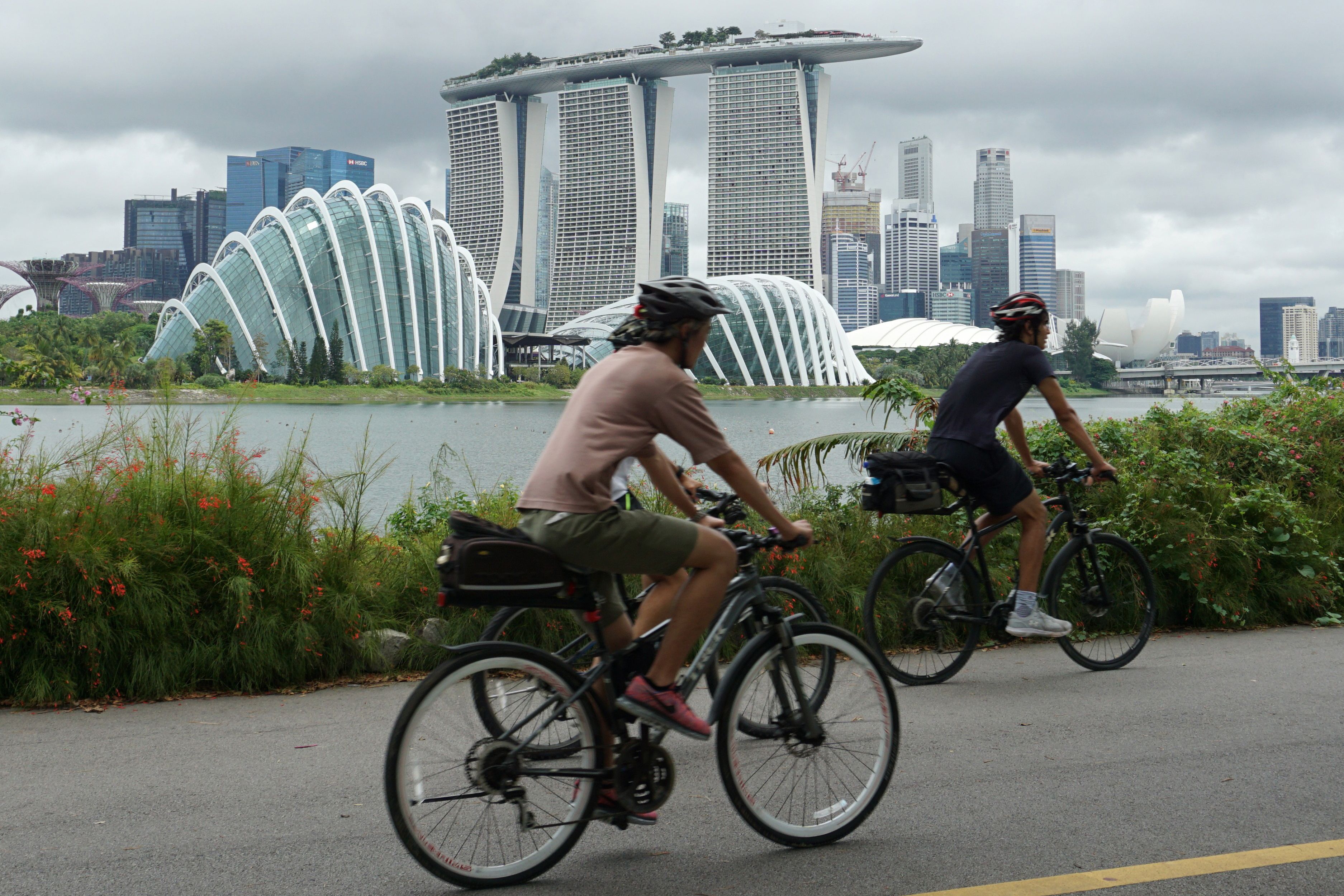
Cyclists riding along Marina Bay overlooking the financial business district in Singapore on July 14. Roslan Rahman/AFP/Getty Images
Singapore has fallen into a deep economic slump — and it's even worse than many had predicted.
The government said Tuesday that GDP likely shrank 12.6% in the second quarter compared to the same time the previous year, marking "the steepest drop on record," according to economists.
GDP shrank by 41.2% in the second quarter compared to the previous three months, more than most analysts had expected.
That officially pushed the country into a recession. Singapore's GDP had already fallen by 0.3% in the first quarter on a year-on-year basis. A recession is defined as two consecutive quarters of negative growth.
The latest decline was due to strict government restrictions, known locally as "circuit breaker" measures, which were enforced from April to June as the country dealt with a sudden spike in coronavirus cases.
This included the shutdown of many businesses, including "the suspension of nonessential services and closure of most workplace premises," the Ministry of Trade and Industry noted in a statement.
Officials had already been bracing for bad news. Prior to the new numbers, the government had slashed the country's economic forecast three times this year alone.
But "it's not all gloom and doom," Yun Liu, an economist at HSBC, wrote in a report to clients.
Recession is here, but it's a short one," she added.
Some analysts believe the worst is over for Singapore, particularly since the government has deployed billions of dollars in stimulus measures to shore up the flagging economy.
"Looking ahead, Q2 will mark the trough," Alex Holmes, Asia economist at Capital Economics, wrote in a research note Tuesday.
"The key reason for optimism is the huge size of the government’s stimulus package, which is equivalent to around 20% of GDP."
Analysis from CNN's Stephen Collinson
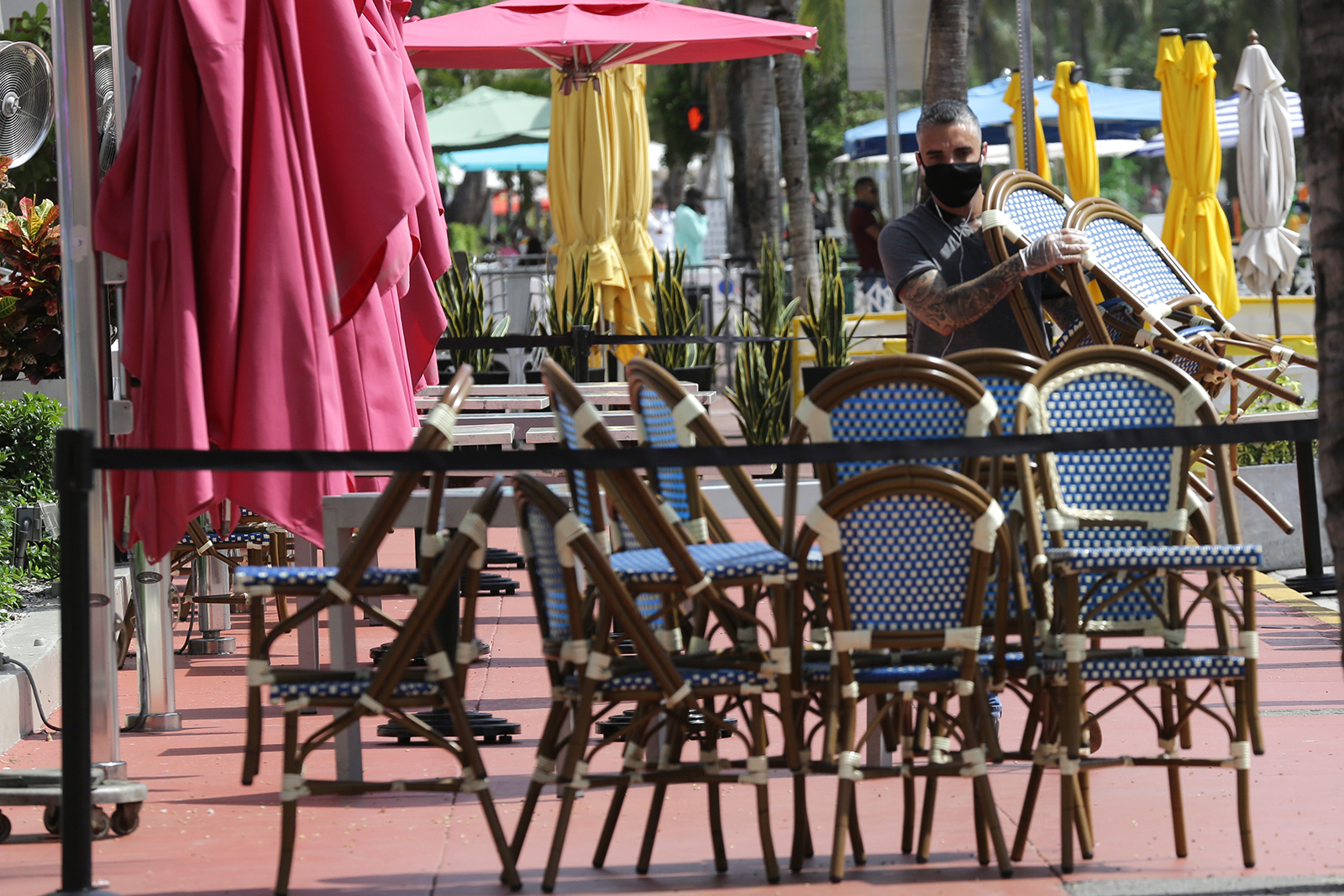
An employee at the Clevelander bar and restaurant stacks chairs as they have shut down due to public health concerns caused by Covid-19 in Miami Beach, Florida on July 13. Lynne Sladky/AP
While US President Donald Trump obsesses about his reelection hopes in his White House bubble, state and local leaders are frantically reversing state reopenings that he demanded, which turned America into the world's biggest coronavirus hotspot.
As emergency rooms filled and the virus quickened its relentless march across southern and Western states, Trump stuck to the fiction that the worst is already over: "We had to close it down; now we're opening it up," the President said of the economy at the White House, patting himself on the back for saving "millions of lives."
As new cases of the disease reach 60,000 a day nationwide, many leaders in both parties, including those who supported Trump's aggressive approach, now have little choice but to prioritize science over politics, leaving the President looking out of touch with reality.
The picture is of a nation that is beginning to shut down again in defiance of the President's triumphant but misleading claims that a "transition to greatness" is under way.
Restrictions imposed on cities as large as Houston and Los Angeles could set back the surprising revival in the economy last month. Modest job gains, trumpeted by the President, could turn into permanent job losses.
From CNN’s Jadyn Sham in Hong Kong and Sophie Jeong in Seoul
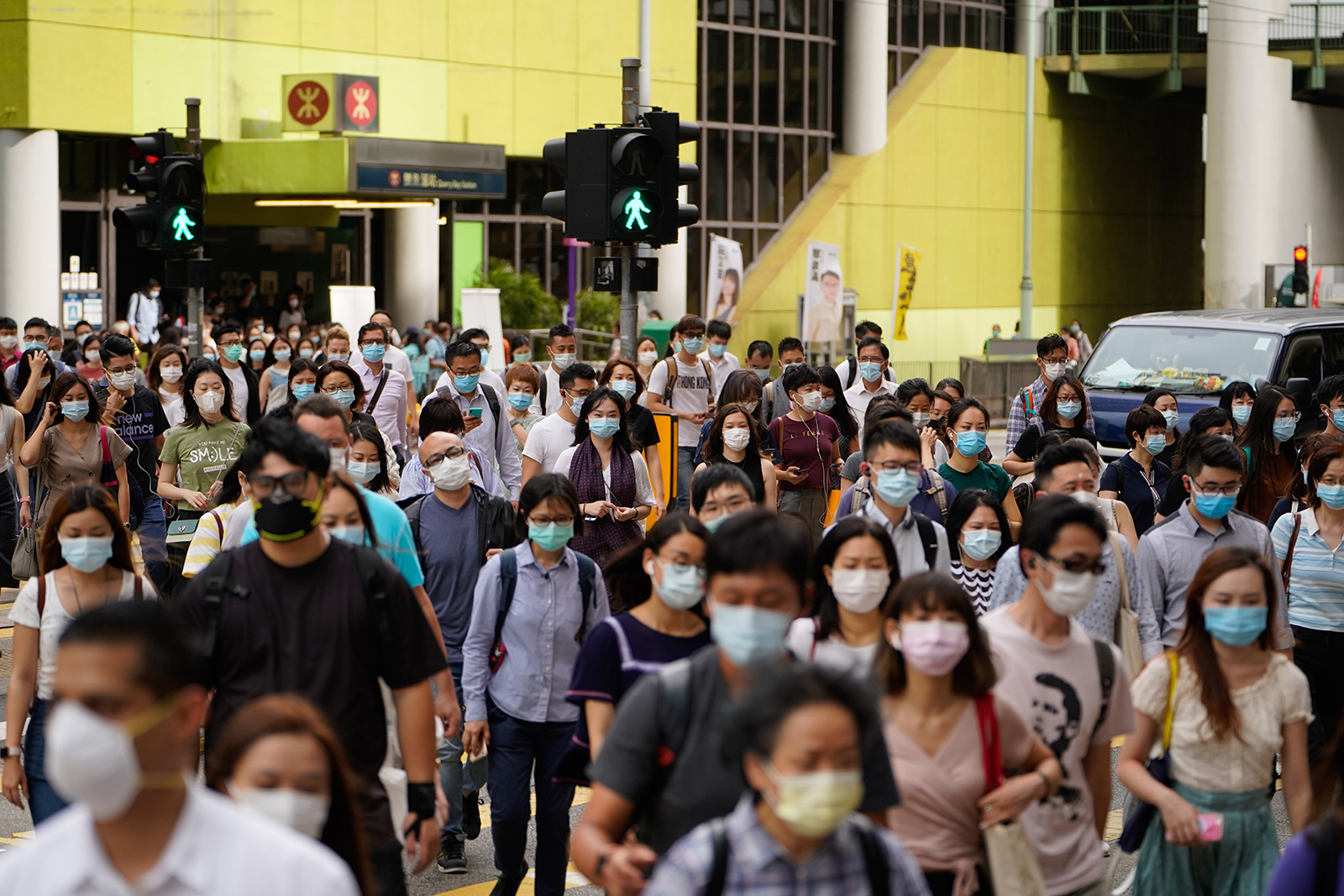
Pedestrians wearing protective masks walk across a road in Hong Kong, China, on July 10. Roy Liu/Bloomberg/Getty Images
Hong Kong is tightening travel restrictions and social distancing measures as it battles a "third wave" of cases.
The city reported 52 new cases on Monday, 41 of which were local transmissions and the other 11 with travel history. This raises the total number of confirmed cases to 1,521.
The past seven days alone have seen 236 new cases -- an alarming surge in Hong Kong, which has been lauded for its quick and effective response to the pandemic. For many weeks before this surge, cases were down to single digits, and sometimes zero, every day.
Under the new restrictions announced Monday:
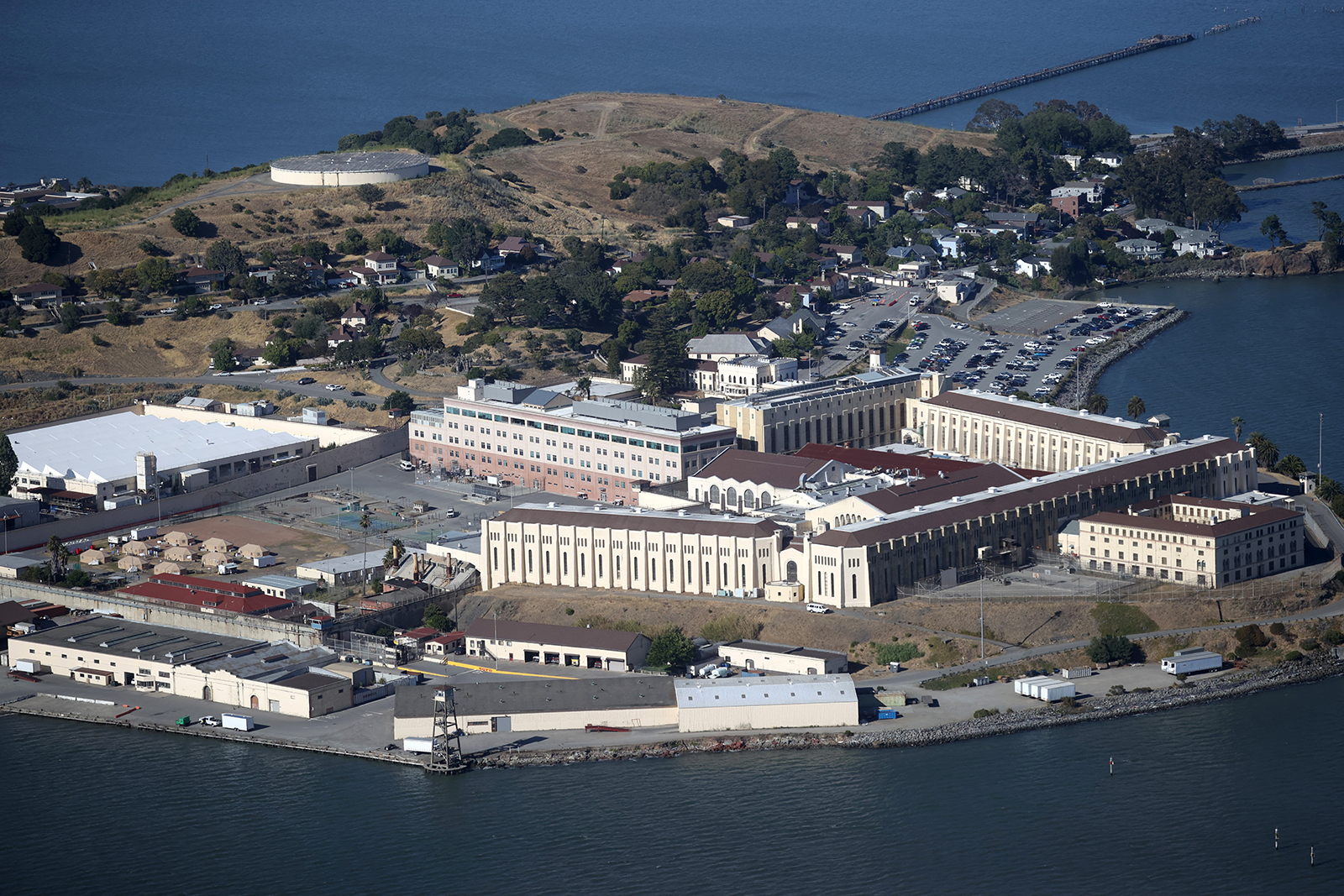
An aerial view of San Quentin State Prison in San Quentin, California as seen on July 08. Justin Sullivan/Getty Images
At least ten incarcerated people at the San Quentin Prison in Northern California have died from coronavirus complications, according to data from California's Department of Corrections and Rehabilitation (CDCR).
San Quentin is the site of the worst coronavirus outbreak in California's prison system, with nearly 1,400 inmates who have tested positive.
The prison population is currently at about 4,000 inmates. It has been reduced by almost 10,000 inmates since March, through expedited transitions to parole and suspended intake from county jails, said CDCR.
There are 2,423 infected incarcerated people in California. There are also 755 CDCR employees who have tested positive across the state.
"CDCR takes the health and safety of all those who live and work in our state prisons very seriously and will continue to work diligently to address the COVID-19 pandemic," CDCR said.
From Angus Watson in Sydney and Zehra Jafree in Hong Kong
The Australian state of Victoria recorded 270 new cases on Monday, according to Premier Daniel Andrews.
The state has been conducting mass testing in response to a spike in cases; it conducted 30,195 tests on Saturday, 22,943 tests on Sunday, and 21,995 tests on Monday.
The decline in cases could be due to stay-at-home order in the cities of Melbourne and Mitchell Shire, Andrews said. Melbourne's lockdown, imposed last Wednesday, will be in place for six weeks -- affecting almost 5 million people.
The state now has 1,803 active cases. Of the new cases discovered Monday, 242 are still being traced.
Fears are growing that the Victoria outbreak may have spread to the neighbouring state of New South Wales, where 13 new cases were reported on Tuesday.
"We are concerned that we have had some seeding from Victoria, where that outbreak has been going on from some time," NSW Chief Health Officer Kerry Chant said Tuesday. "We share a long border with Victoria, we are intrinsically linked with Victoria, we have a lot of travel and connections," Dr Chant said.
Frmo CNN’s Swati Gupta in New Delhi and Angus Watson
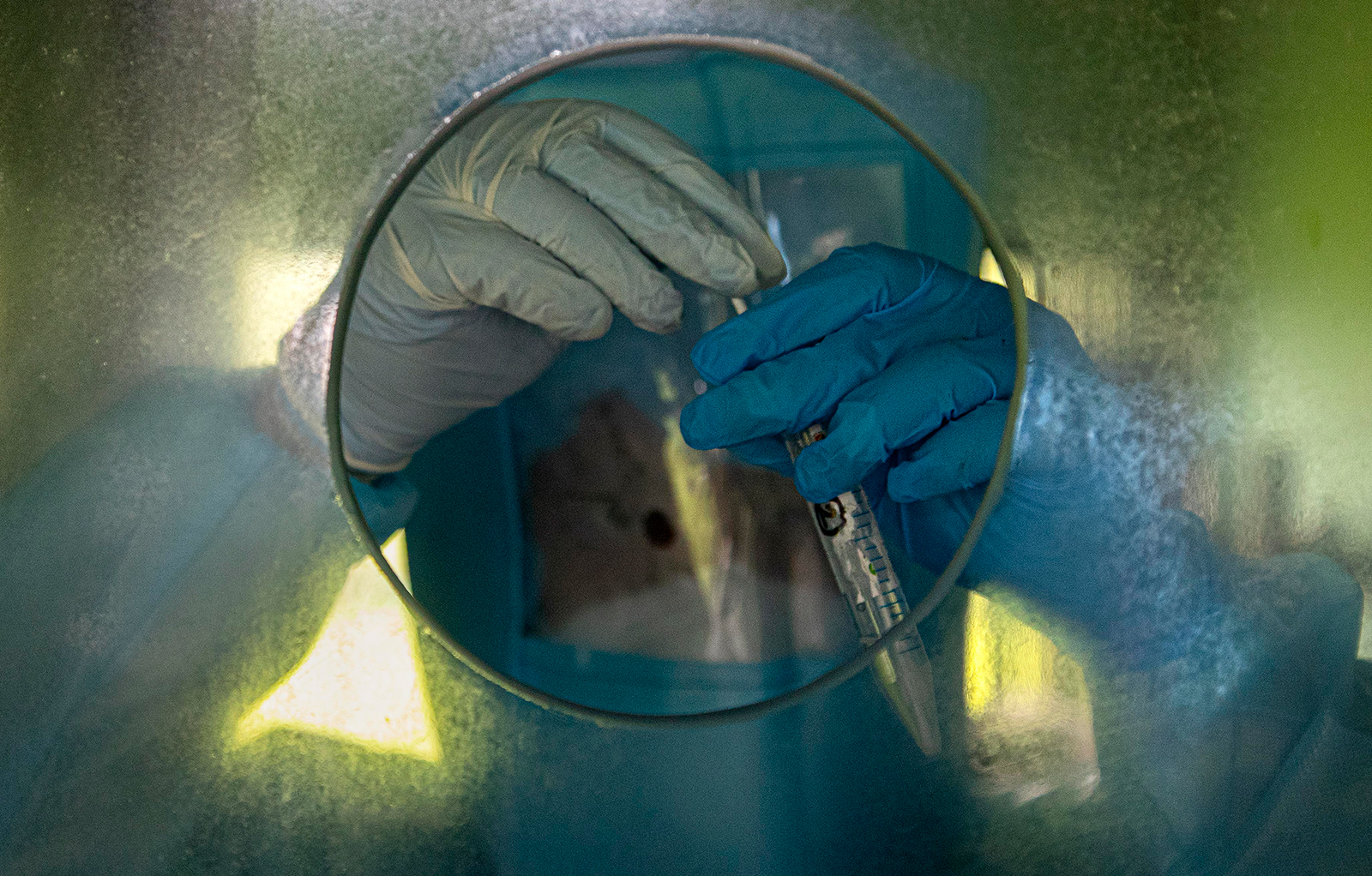
An Indian health worker collects nasal swab samples at a Covid-19 testing center in Gauhati, India on July 12. Anupam Nath/AP
More than 100,000 people in India have tested positive in just the past four days, said the Indian Ministry of Health and Family Welfare on Tuesday.
The country recorded 28,498 new cases and 553 new deaths in the last 24 hours, said the ministry. That raises the country's total to 906,752 cases and 23,727 deaths.
Not all these cases are active: More than 571,000 have recovered from the virus, leaving 311,565 cases still active.
More than 12 million tests have been conducted nationwide, according to the Indian Council of Medical Research.
From CNN's Shelby Lin Erdman
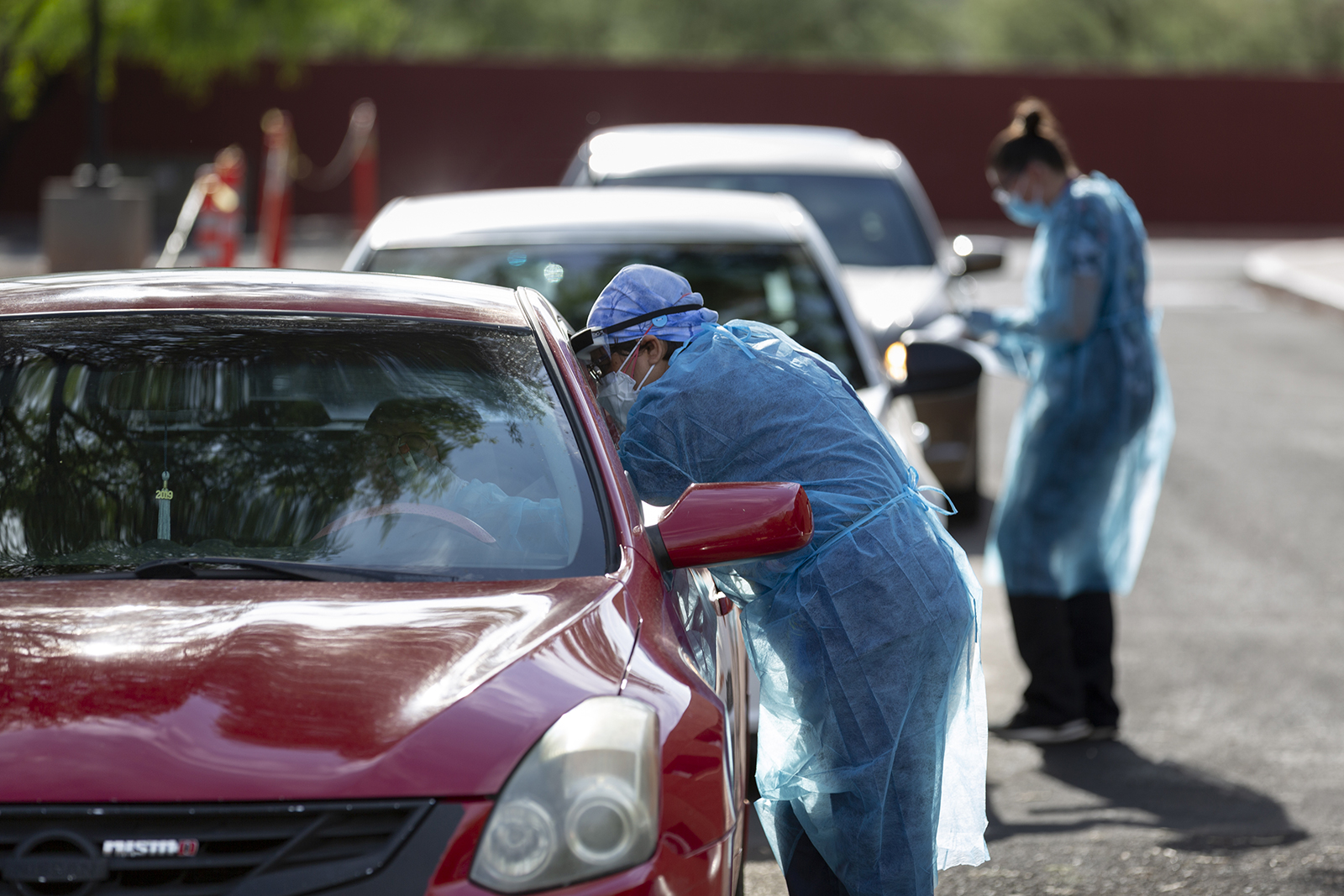
Healthcare workers wearing personal protective equipment (PPE) administer tests at a Covid-19 drive-thru testing site in Tucson, Arizona on July 13. Cheney Orr/Bloomberg/Getty Images
Surging coronavirus cases across the United States are causing delays in getting test results from laboratories, according to Quest Diagnostics, a leading provider of diagnostic services.
“Soaring demand” for a Covid-19 molecular test is “slowing the time” the company can provide test results even after rapidly scaling up its capacity, Quest said Monday.
Increased capacity: The company has already doubled its testing capacity from two months ago, and now is able to perform 125,000 molecular diagnostic tests a day. By the end of the month, it expects to have the capacity for 150,000 tests a day.
Despite this increase in capacity, it's taking up to a day to process test results for its priority patients: hospital patients, pre-operative patients in acute care settings and symptomatic healthcare workers. For all other cases, it’s taking on average seven or more days, said Quest in a press release.
The company is facing challenges in trying to ramp up testing: Global supply constraints are still an issue, the company said.
The lab network is trying to add new technology platforms and is considering an expansion of its lab referral program.
But the company cautioned that it can’t reduce its turnaround time on testing results as long as Covid-19 cases continue spiking across the country.
“This is not just a Quest issue. The surge in Covid-19 cases affects the laboratory industry as a whole,” the company said.
From CNN's Claudia Rebaza in London
Peru surged past 330,000 confirmed Covid-19 cases on Monday. It remains the country with the second highest number of cases in Latin America, behind Brazil.
The Peruvian Health Ministry reported 3,797 new cases and 184 new deaths in the past 24 hours.
This raises the country's total to 330,123 cases and 12,054 deaths since the pandemic began.
From CNN's Rodrigo Pedroso in Sao Paulo and Chandler Thornton in Atlanta
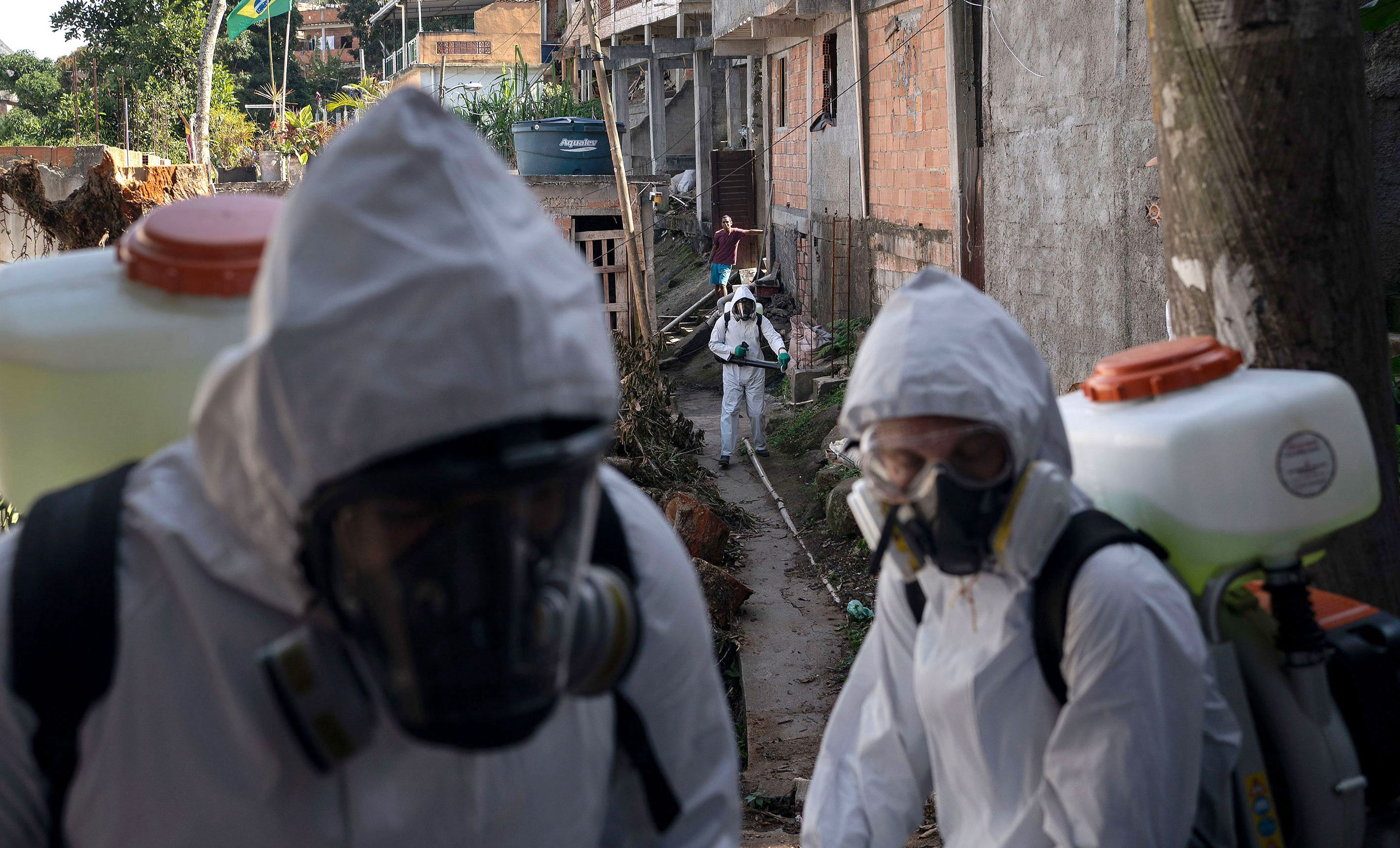
Volunteers spray disinfectant in an alleyway as a precaution against coronavirus on July 12 in Rio de Janeiro, Brazil. Leo Correa/AP
Brazil has seen more than 260,000 new coronavirus cases in the past week alone, according to data from the Brazilian Health Ministry.
On Monday, the ministry recorded 20,286 new cases, bringing the country's total number of confirmed cases to 1,884,967.
261,683 of those cases came from the past seven days.
The nationwide death toll stands at 72,833.
President tests positive: Among the new cases recorded in the last week was Brazilian President Jair Bolsonaro, who announced he tested positive for the virus on Tuesday.
Bolsonaro will take another Covid-19 test this week, the official doctor for the presidency told CNN affiliate CNN Brasil on Monday, and reported he is "doing well."
The President also announced that day he had taken hydroxychloroquine on the advice of his medical team and posted a video on his official Facebook page later showing himself taking what he claimed was a third dose of the drug.
From CNN's Karol Suarez in Mexico City and Florencia Trucco
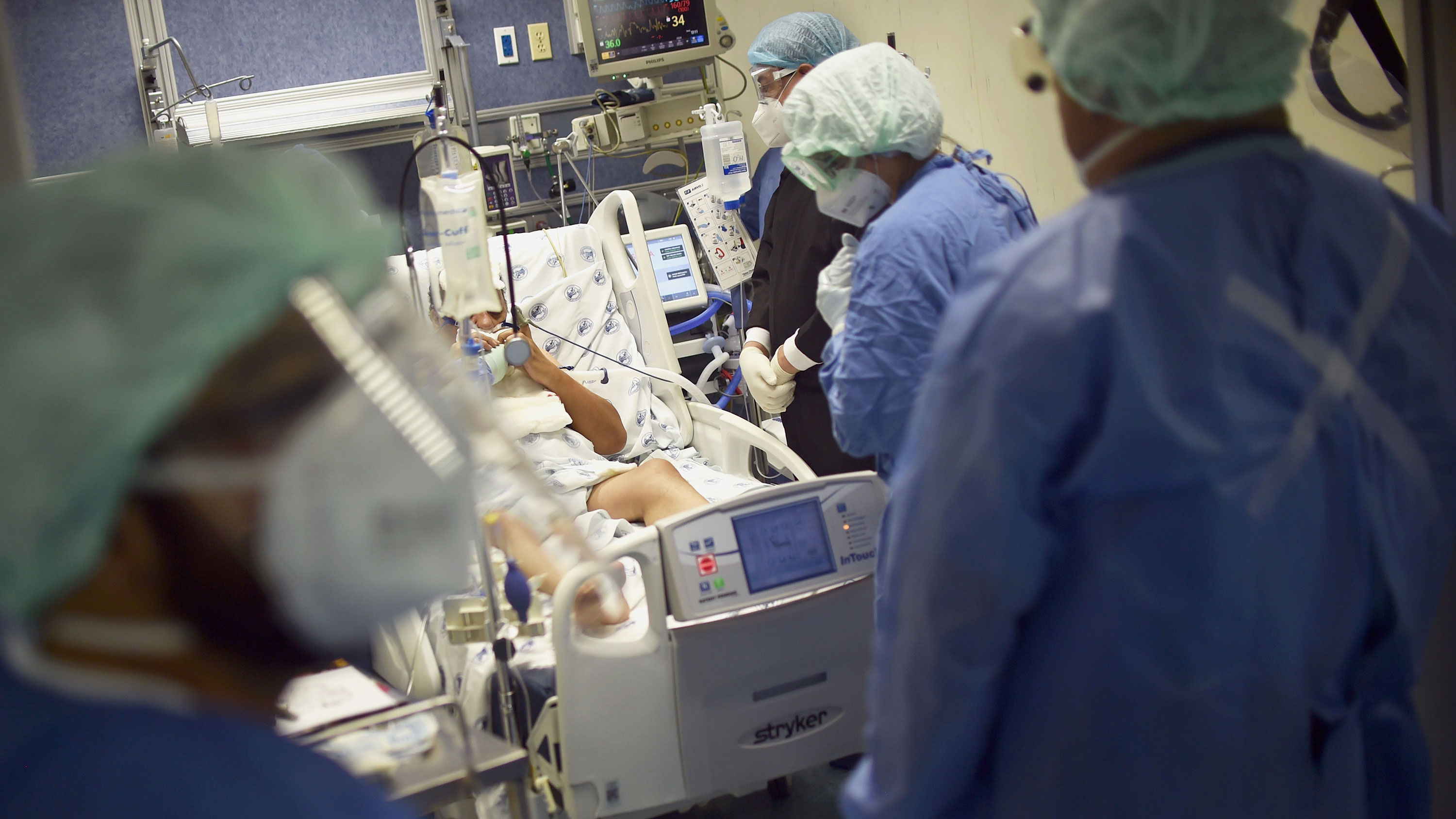
Doctors and a respiratory therapist assist a Covid-19 patient at the Juarez de Mexico Hospital, in Mexico City, on July 8. Rodrigo Arangua/AFP/Getty Images
Mexico confirmed 4,685 new Covid-19 cases on Monday, bringing the total number of infections to 304,435.
The Mexican Health Ministry also reported 485 new deaths, bringing the country’s coronavirus death toll to 35,491.
President claims progress: Earlier Sunday, Mexican President Andrés Manuel López Obrador said claimed the pandemic "is losing intensity."
The president made the comments before the Sunday figures were released, but the country has reported consistent daily increases in cases throughout the pandemic.
"I want to tell you that the report is positive, is good, the conclusion is that the pandemic is decreasing, is losing intensity," he said in a video address to the nation.
Source:https://edition.cnn.com/world/live-news/coronavirus-pandemic-07-14-20-intl/index.html
Here are the key global developments in the coronavirus pandemic from the last few hours:
· Cities and states around the world returned to tighter coronavirus restrictions to battle recurring outbreaks, as global infections passed 13 million and the World Health Organization warned there were “no shortcuts out of the pandemic”.
· Hong Kong will impose strict new social distancing measures from midnight on Tuesday, the most stringent there since the start of the pandemic, as authorities warned the risk of a large-scale outbreak was extremely high.
· In the Philippines, a quarter of a million people in Manila will return to lockdown in an attempt to stall the infection rate there. With just over 57,000 cases, the Philippines has the second highest number of infections in south-east Asia. Nearly 1,600 people have died in the country over the course of the pandemic so far.
· In the US, California’s governor ordered all bars to close statewide and all restaurants, cinemas and museums to halt indoor operations, in a dramatic rolling back of reopening efforts as cases continue to surge. The US has reported roughly 60,000 new cases a day for almost a week, according to the Johns Hopkins University tracker.
· The New York Times reported that about 5.4 million Americans lost health insurance in the pandemic, more than have ever lost coverage through job losses in a year, according to a new study, as the Trump administration ramped up its war with Anthony Fauci, the federal government’s top public health expert, over the handling of the crisis.
· As Australia’s cases passed 10,000 on Tuesday, the state of New South Wales also introduced restrictions on bars. The measures are partly in response to a new cluster at a Sydney pub called The Crossroads. New South Wales recorded 13 new cases as of Monday evening, in addition to 10 cases connected to the pub.
· In the Australian state of Victoria, 270 new cases of the virus were identified overnight. Staff from the private sector including airlines, telecommunications companies and banks, as well as 1,000 additional Australian defence force personnel, will be deployed to help efforts to contain Covid-19 in the state.
· Health officials in Tokyo, Japan, appealed on Tuesday for more than 800 theatregoers to get tested after a production starring a Japanese boy band was found to be the source of at least 20 cases.
· Britain must start “intense preparations” for a second wave of coronavirus that has the potential to kill as many as 120,000 hospital patients in a worst case scenario, experts have warned.
· Face masks will become mandatory in shops across England, ministers are to announce on Tuesday, following mixed messages, a cabinet split and mounting pressure on the country’s prime minister Boris Johnson to change public advice.
· More than 880 employees of private contractors running US immigration detention centres have tested positive, according to congressional testimony given by company executives.
· An entire hospital in Mexico’s southern Oaxaca state has been put in quarantine, after 68% of its remaining staff tested positive.